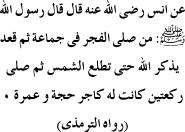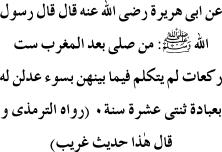Navigation: [ Back ] [ Up ] [ Next ]
After performing wudű’, one should pray two rak’ât
of nafl, known as Tahiyyat-ul-Wudű’. Several hadîth
have mentioned the blessings and benefit of doing so. For example:

“There is no Muslim who performs wudű’ and performs it
well and then stands and offers 2 units of prayer with devotion of heart and
mind in the two of them, except that Paradise becomes guaranteed for him”
[M-288, from Muslim]
However, it should not be performed if it is one of the makrűh or
prohibited times of salât.
Upon entering the masjid (mosque), it is sunnah
to perform 2 rak’ât of prayer, as a greeting and honor towards Allâh
and His house. It is best to perform these 2 rak’ât before sitting
down, unless it is a makrűh time. However, if one sits first and then
afterwards performs this prayer, it will be valid as well but less rewarding. If
one visits the masjid multiple times in a day, it is enough to perform Tahiyyat-ul-masjid
once. Also, if one enters the masjid and performs any other sunnah, nafl
or fard prayers, it will suffice for the Tahiyyat-ul-masjid.

Hadrat Abu Qatâdah (Allâh be pleased with him)
relates that the Prophet (
 )
said, “When one of you enters the masjid, he should not sit until he has
prayed two rak’ât.” [RS-1144, agreed upon]
)
said, “When one of you enters the masjid, he should not sit until he has
prayed two rak’ât.” [RS-1144, agreed upon]
After completing Fajr salât, one does not move
from one’s place and remains there reciting dhikr, tasbîh,
Qur’ân, etc., avoiding participation in worldly affairs until the sun has
fully risen (at least 15 minutes after sunrise). Then, one stands and offers two
or four rak’ât of nafl. This is called Salât-ul-Ishrâq.
The Prophet (
 )
said:
)
said:

“Whoever prays Fajr with the congregation (jamâ’at)
and then sits and remembers Allâh until the sun rises and then prays two rak’ât,
he will have the reward of a Hajj and ‘Umrah.” [T-567]
This prayer is also known as Chaasht namâz.
It is performed after the sun has risen high in the morning, after about
one-third of the day has passed and it lasts until zawâl. One may
perform 2, 4, 6, 8, 10 or 12 rak’ât of nafl.

Hadrat ‘Â’ishah (Allâh be pleased with her)
was asked how much the Prophet (
 )
used to pray for the Duhâ prayer. She said, “Four rak’ât or
he increased it as Allâh wills.” [M-1235, from Muslim]
)
used to pray for the Duhâ prayer. She said, “Four rak’ât or
he increased it as Allâh wills.” [M-1235, from Muslim]
Also, the Prophet (
 )
was reported as saying:
)
was reported as saying:

“Whoever prays 12 rak’ât for the Duhâ
prayer, Allâh will built a golden castle for him in Paradise.” [M-1240, from Tirmidhi,
Ibn Majah]
After performing the fard and sunnah
of Maghrib, one may perform from 6 to a maximum of 20 rak’ât nafl.
This prayer has been called as Awwâbîn. (This name is sometimes also
applied to the morning prayer.)
The Prophet (
 )
reportedly said:
)
reportedly said:

“Whoever prays, after the Maghrib, six rak’ât
without talking of anything indecent in between them, it would be equivalent to
twelve years of worship for him.” [M1173, from Tirmidhi]

“The one who prays twenty rak’ât after
Maghrib- Allâh will build for him a house in Paradise.” [M-1174, from Tirmidhi]
Of all the nafl prayers, that prayer which is offered in the
middle of the night, known as Tahajjud or Salât-ul-Layl, is the
most rewarding and beneficial:

“The best salât after the prescribed (compulsory) prayers is the night
prayer (ie. tahajjud).” [RS-1165, from Muslim]

“There is a certain period of time in the night during which if a
Muslim prays for anything beneficial to his life in this world or the next, it
will be granted to him. And this time occurs every night.” [RS-1178, from Muslim]
There are many other narrations mentioning the thawâb (reward)
that is brought by engaging in this prayer.
The number of rak’ât prayed in tahajjud should be
between 4 and 12 rak’ât. They can be performed in units of two or four
rak’ât each. It is best to wake up in the middle of the night to
perform the tahajjud. However, if one is not sure that one will be able
to do so, then one can pray four rak’ât right after the 2 sunnah
mu’akkadah of ‘Ishâ with the intention (niyyah) of tahajjud.
Although the reward will be much less, the pious authorities of the religion
have advised this method for those who find it difficult to wake up later in the
night. The Witr prayer should be offered after the tahajjud.
Navigation: [ Back ] [ Up ] [ Next ]

![]()